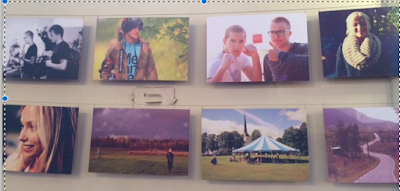I love
stories, and the stories behind stories. For the past few weeks I’ve been traveling and listening to lots of stories: about people who lived long ago, recording their tales with stones and paint. and about people alive today, remembering events from before I was born, or sharing their stories in photos and Facebook posts. Lots of stories - of conflict, change, endurance, enterprise.
 |
| Swedish Rune Stone, Swedish History Museam |
In recent conversations with relatives near and far, I've been reminded that some stories stir delight, while others are less eagerly told. What do we do when
our own stories seem to shatter into pieces, or stall to unsalvageable
conclusions?
I
sometimes think of Emily Dickinson’s poem:
My life closed twice before its close;
It yet remains to see
If Immortality unveil
A third event to me. . .
I’ve been
struck, traveling this month in Finland, Estonia, and Sweden, at how lives sometimes seem
to close, at how chapters end abruptly. War separates families, redirects
careers, disrupts and rearranges. Peace does the same. As does poverty.
Traveling through European cities, we see evidence of lives uprooted, stories
pulled from one place to another.
My own life
has closed more than twice, with abrupt changes far beyond my control:
relocations without goodbyes, plans suspended without explanation. With
each twist of plot, the adventures grow deeper, the challenges richer, the
rewards sweeter, than I could have foreseen, yet I still struggle when the
story takes an unexpected turn.
As part
of my Sabbath season several years ago, I found myself working through To Be Told: Know Your Story, Shape Your Future, Dan Allender’s book and small
group process.
Allender
challenges his readers to look closely at the chapters that have gone before,
to examine the places of pain, defeat and struggle, and to see where God may be
leading, to celebrate the ways He’s been at work.
A
friend who wanted to do this asked if I would help launch a small To Be Told story group. At the time I was busy,
but when my schedule became clearer, I came back to the idea. How hard could it
be to write chapters from our lives, share them with others, and see where God
is leading?
Turns
out it’s far harder than I thought. I’m great at compartments, and at stashing
those dark, unfinished parts of the story in cupboards where I don’t need to
see them.
But the
story isn’t over, and as I've rummaged through experiences I thought I'd left
behind, I see patterns repeating, places where fear and unresolved pain have sometimes kept me
from moving as freely as I’d like
 Here’s
one of the assignments from the To
Be Told workbook:
Here’s
one of the assignments from the To
Be Told workbook: To your well of stories [a list of personal scenes to explore], add scenes where you saw redemption and where it was absent; where great suffering occurred and where nondramatic, routine suffering occurred; where there was peace and where there was resolution. In other words, add stories of shalom, shalom shattered, shalom sought, and denouement (58).It's easy to point back to points where shalom shatters, not too hard to find places of joy, but "redemption"? Does redemption play out in the ongoing chapters of our lives?
Here’s
a follow-up question: “”Which stories are you avoiding?” (59)
As nations, families, communities, churches, there are some stories we tell, some we
avoid. Some stories expand in engaging ways.
Others cause worried looks, clearing of throat, sudden change of subject.
According
to Allender,
And redemption becomes visible when we take time to trace shalom both shattered and restored.
Stories are meant to be told. . . . Telling them is a gift you give others, By telling your stories, you offer a bit of yourself in a world of small talk, pager messages, and email. You offer others a glimpse of what it means to be human and of the struggles that are common to us all, and you invite others into community (122).Stories may be gifts, but it's also true that processing the past is hard, painful work. Staying open to the future depends on facing that work, chapter by difficult chapter.
And redemption becomes visible when we take time to trace shalom both shattered and restored.
Just
months ago I had no idea that my story would take me to the Finnish countryside,
or on a watery excursion in a land of lakes and islands, or to the streets of Tallinn, Estonia, where not so long ago the story of freedom seemed gone forever.
I trace my own story with amazement, wondering where the latest twists and turns will lead. And listen with thanksgiving to other, larger stories I hope to share in future posts.
I don’t know the end of my story, or of anyone else’s. I do know the story isn’t over, and that in ways that go beyond understanding, painful chapters can be redeemed and broken pasts can lead to unimagined futures.
I trace my own story with amazement, wondering where the latest twists and turns will lead. And listen with thanksgiving to other, larger stories I hope to share in future posts.
I don’t know the end of my story, or of anyone else’s. I do know the story isn’t over, and that in ways that go beyond understanding, painful chapters can be redeemed and broken pasts can lead to unimagined futures.
 |
| Photos from the ongoing chapters of Tallinn Church, Estonia, a church that has been part of the story of Tallinn since before 1219. |
[This summer I'm reworking some earlier posts, as travel and time outside limit my time for blogging. This blog appeared, in slightly different form, on July 17, 2011]
Please join the conversation. Your thoughts and experiences in this are welcome. Look for the "__ comments" link below to leave your comments.





